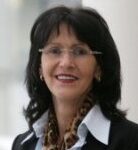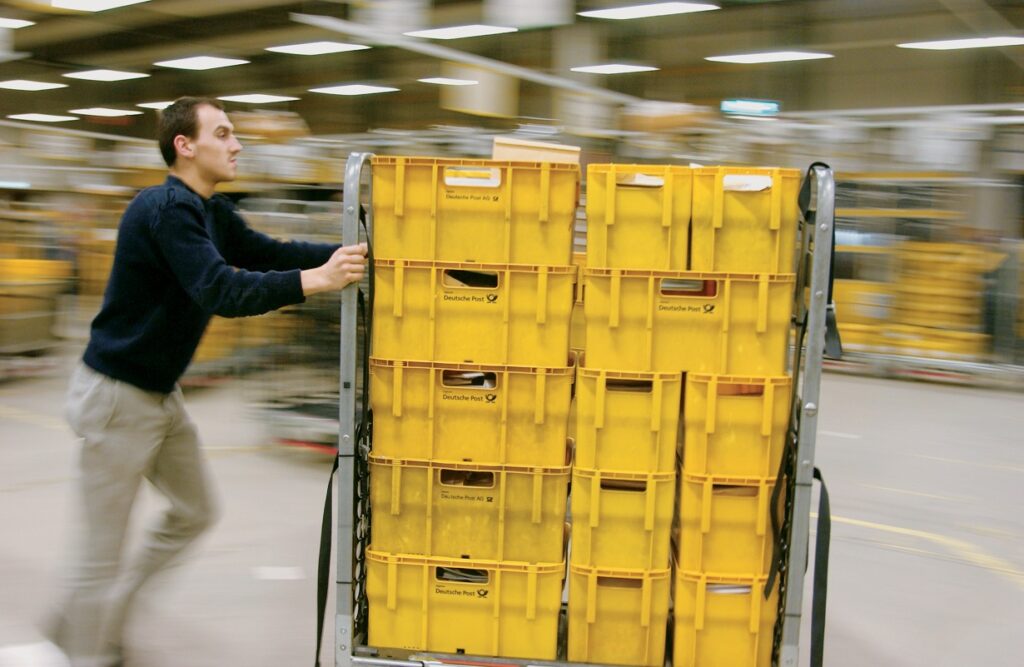Regine Buettner is EVP HR Global & Europe at DHL Express. She is an international HR executive with over 20 years of experience. Prior to joining DHL in 2007 she was Senior Vice President HR at Deutsche Telekom and, before that, Senior Vice President HR of T-Systems.
1) What are your biggest challenges now around attracting and retaining talent?
Being the most international company in the world, operating in 220 countries globally, and having job opportunities ranging from frontline workers, to IT architects, all the way to finding pilots, we have our share of challenges.
Finding people in different markets with the right skillsets is important but finding people with the ‘can do’ attitude which is all imperative for our company is even more so. In our business we need people who can demonstrate our behaviours of working with “Speed”, getting things “Right 1st Time”, demonstrating “Passion” and having a “Can Do” spirit. A failed delivery in Hong Kong, for example, can impact the entire network, so we need consistency globally. Our challenges are finding the right people, finding them quickly and finding them in the right location. Our next challenge is retaining new talent.
Our goal is to have emotionally engaged customers but the only way to get there is by having emotionally engaged employees.
Individuals who stay with the company for more than two years will typically remain with us because of the diverse career opportunities. With so many offices in so many locations, the sky is the limit for our employees when it comes to looking for a new role. It is not uncommon for a person to start their career with DHL in IT in one country then one day move into operations in another country and then finally finding themselves working in HR in another continent.
Changing functions throughout your career is encouraged at DHL but if we don’t engage and onboard new talent effectively, we will lose them.
2) What has been your most successful initiative in building your employer brand at DHL?
It all starts with our people. We have a workforce of motivated people who are insanely customer centric and will do everything to get the job done for the customer. Our cornerstone award-winning Certified International Specialist (CIS) program is a company-wide employee program which develops a culture of engaged people who have a global understanding of our customers and business.
It was launched globally in 2010, at a time when DHL Express was going through a period of organizational change and refocusing on its core competence of international express delivery. CIS took employees of all levels of the business back through the history of DHL to give them a clearer understanding of the company’s culture, operations and entrepreneurial roots. It also equipped them with the skills and knowledge to become specialists in international trade. CIS has since grown into our main internal development program. Staff engagement levels (based on an annual independent survey) have increased by 14 percentage points over the last four years.
Over 100,000 employees around the world have been certified as international specialists. This community of specialists have helped the company to outgrow the market and deliver great financial results, which in itself increases our attractiveness as an employer of choice. Every one of them has become an ambassador for the company and has increased our appeal to potential recruits.
3) What would you say defines your employee engagement strategy?
It all starts with the customer. Our goal is to have emotionally engaged customers but the only way to get there is by having emotionally engaged employees.
This is what defines our engagement strategy. The way we get there is through a combination of approaches. We have a slogan, “As One,” that perfectly guides our employee engagement approach. Our business model depends on a global network and it’s our community of specialists that link it together. We are “the world’s most international company,” operating in more countries than the UN. In our network it is important that everyone works ‘As One.” We reinforce this message in all our staff engagement activities, and an important role is played by our top management, who also lead from the front in demonstrating that we are one team.
We have regular engagement events, such as our “As One” Appreciation Weeks, which are opportunities for management to thank all staff for their hard work with events, gifts and other gestures. These are usually themed according to our global partnerships with Formula One, Cirque du Soleil and others, which emphasizes to staff that these partnerships are also for them. We have a recognition framework consisting of six pillars of recognition for all our employees. In that framework our flagship program, Employee of the Year celebrations, are also always spectacular events, where we bring all our best-performing staff to one special location in their region for a few days of team-building, fun experiences and glitzy gala dinners. There, our top management can directly say thank you for their effort.
These are all great initiatives but the most effective is when we engage in dialogue with our people. Every year we conduct a survey to receive feedback from our employees and then use the information to guide our conversations with teams. The result: everyone can participate in developing thousands of actions to improve the work environment to better service our customers.
4) What do you think the HR function will look like in five years?
I think our European CEO, John Pearson, says it best: “I expect HR to be the guardians of our people.”
The HR function will be a partner, guarding the interests of people and business for the mutual success of both. Our goal is to drive performance through an engaged workforce. For example, engagement within an organization is not just the task of HR. Everyone has a role to play when it comes to engagement. HR, however, has the skills and tools to help drive employee engagement, and can play a key role in consulting and guiding the rest of the business on how to engage the workforce effectively. To be successful and relevant in the future, the HR function will have to better understand our customers’ needs and ensure our people are prepared to meet those needs.
HR will be that strategic partner that will help companies succeed
This way we guard and align the needs of our business to the goals and ambitions of our people. HR will play the role of consultant and mentor to the rest of the business on all people topics. These are exciting times to be in HR. People are the greatest assets of any organization and as the competition to find talent in the coming years increases, HR will be that strategic partner that will help companies succeed.
5) What do you think is your biggest HR challenge at the moment?
In the case of DHL Express, it’s probably standardisation. It’s important in a global business that we strike the right balance between ensuring that policies and processes are standardized globally (which allows you to remain efficient, transparent and able to drive excellence from the center) and allowing our individual country entities to adapt to meet the specific requirements of their markets.
There’s nothing basic about the basics.
In a constantly changing environment, where every market has its own unique labor legislation, working practices and culture and these are subject to periodic change, you constantly have to ensure that you are up-to-date with the latest developments around the world and that your HR approach is flexible enough to adapt to change while still based on global principles. We have been able to address this through “thinking global and acting local,” having a diverse but closely connected team. We have global and regional HR teams made up of specialists with a broad understanding of many different markets and cultures, and country teams made up of HR professionals with deep insight and experience within their particular markets and enough autonomy to adapt our global standards to their markets if this is absolutely necessary.
6) Can you give us some tips you’d give to other HR directors looking to become a Top Employer?
One important point that, Ken Allen CEO of DHL Express, often makes, is that “there’s nothing basic about the basics.”
If you concentrate on continuously improving the fundamental drivers of HR performance, then you will see them improve. Also, despite the fact that it is something that’s quite intangible and not easily measured in financial terms, I cannot stress enough how important a focus on engagement is. It can’t just be something HR does, it needs to come from the leaders of the company and everyone play a role in their engagement. When everyone recognises it’s important, it will be ingrained in the culture.
Engagement within an organization is not just the task of HR.
Motivated employees make for a top-performing company, which in turn is an attractive employer for new talent. Finally, I would also encourage my colleagues in other companies to embrace the Top Employer Institute certification process, because that in itself provides a framework for improving your processes, validating them through an independent third party and benchmarking them against other players in the market. We are delighted to have been recognized as one of the five companies worldwide to be a Top Employer Global, but we also gained a lot from participating in the process.






